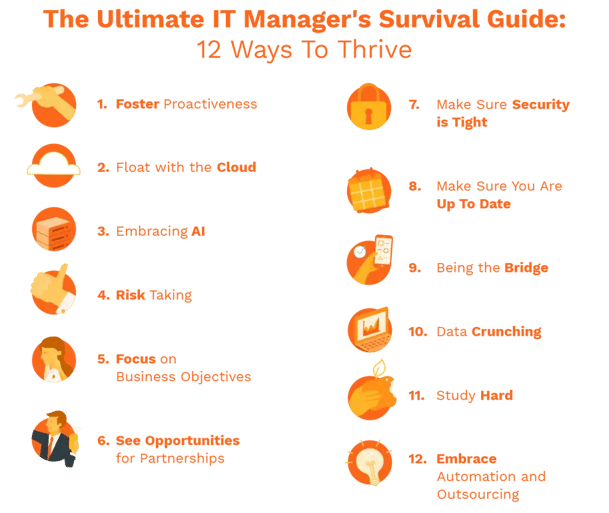Being an IT manager is no easy task. Every day there’s something new and everyday there’s something new that needs your attention. There are plenty of tips out there, but here is a great survival guide to make sure that your IT skills are kept honed and sharp to thrive in the coming years. As you well know, technology is a constantly shifting and changing platform that requires adaptable minds in order to keep up with it. Our guide will help you understand this philosophy and help apply it to your IT servicing skills.

1. Foster Proactiveness
Being proactive is always key. It is a common theme in many IT arenas and it should be no exception in yours. Fostering proactive work paradigms and cultures will allow you and your network strategy thrive. Instead of having to face downtime and constantly be anxious about potential outages and repair jobs, you and your team can instead monitor and upkeep the technology your office works with. This will not only save time and money, but giant headaches that might come forth.
2. Float with the Cloud
The cloud is so important. It is an integral part of many businesses and offices these days and not utilizing the cloud makes it difficult to make sure that technological operations are running smoothly. Instead of having to rely on tons of hardware and maintenance to ensure that information is kept secure and safe, the cloud can help lighten that load and make your work as an IT manager optimized and kept running well.
3. Embracing AI
Artificial Intelligence is still in its relative infancy, but it is rapidly becoming a powerful force in all sectors of business, academia, and the office. AI helps manage data loads and provides greater protective coverage over the office. It would be beneficial to any IT professional to research current AI technology and see how your company and network could benefit from its technology. Instead of fearing AI, embracing it will allow you as an IT manager to remain ahead of the technological curve and allow for an efficient and smooth workflow.

4. Risk Taking
Risk taking seems counterintuitive when it comes to IT, but it really is not. Coupled with being proactive, risk taking can yield great benefits so long as you find a good balance between safeguarding and allowing freedom. Risk taking can bring innovation and allow your IT capabilities to scale and improve upwardly. Don’t be afraid to take risks when need be.
5. Focus on Business Objectives
Sometimes IT managers feel the need to distance themselves from the business or office as a whole. Because IT professionals are like the doctors or police force guarding the office or business, there is an expectation to remain neutral and always prioritize keeping things running first above anything else. Instead of adopting this mindset, try and align your technology and IT objectives alongside the overall business objectives. It is critical to understand that business objectives are only kept afloat because of the hard work IT managers do, so instead of pushing your place further away make sure that your objectives are close to the ones set by the business or office.
6. See Opportunities for Partnerships
In any innovative and successful team, it may always seems like you’re one person short. What better way to fill that role than through a partnership with a team of IT experts? Naturally during your time as an IT manager, it is impossible to not, at one point, work with other IT professionals. Although extra help may never seem like a bad idea, it is important to set a standard to ensure everyone involved in your network has the same IT vision and goals as you. As the manager, you understand your IT strategy more than anyone else and should seek out outsourced partners that make sense to the success of your company.

7. Make Sure Security is Tight
Security is an important part of any IT manager’s responsibility. Security is the line of defense that protects employees and company data from being hacked, stolen, breached, deleted, etc. Making sure that there is proper training and a culture that values data security is important. Training employees with the property security protocols and making strategies emphasizing the importance of security is an extremely important facet and should not be neglected.
8. Make Sure You Are Up To Date
Because technology is constantly changing, you need to make sure you are always up to date with the current trends and outlooks. Knowing and understanding is half of what goes into your IT strategy. Don’t overburden yourself by keeping up with EVERY single trend or change. Instead, focus heavily on what matters most to the office or business or what is most relevant to your duties as an IT professional. By keeping up to speed with important innovations in technology, you are allowing your IT skills to thrive and become stronger.
9. Being the Bridge
Coinciding with being up to date with the changes in your industry, as an IT manager you are the bridge. What this means is that you should accept and understand the role of being the lifeline between the office and its technology. Find the right balance between being having the stability to support as well as the structure and strength to maintain, just like a bridge does. Filter and sort what information is necessary that allows the office to continually have a strong ecosystem. .webp?width=639&height=293&name=Artboard%201%20copy%20(1).webp)
10. Data Crunching
Data is important to understand and comprehend as much as it is to safeguard. Data will give you meaningful insights into day to day operations and assist you in changing strategies and understand what needs to be adapted to. If you’re stuck on what to do or how to do it, look no further than the data that is being collected and make changes accordingly.
11. Study Hard
Studying hard may seem like an old mantra from the days of high school and college, but it is imperative to study hard even throughout your time as an IT manager. Studying up on the latest techniques, data, and overall trends are going to go along way in helping you maintain and repair technology. As things move forward, studying is the only option to take when it comes to being prepared for any IT situation that may occur.
12. Embrace Automation and Outsourcing
Not every issue can be resolved effectively in-house. This is not a reflection of ability but more of practicality. There is nothing wrong with embracing automated IT processes and outsourcing IT work to other sectors. IT outsourcing is a rapidly growing industry and embracing automation is pioneering the future where automated services will increase the scalability and output of what your IT can do for you.
The success you experience in your role leads to the success of your overall IT team, its network, and company as a whole. This study guide can’t answer every question or address every concern but hopefully, it will be able to give you the proper advice and tips that will help you throughout your journey.
Categories: Security, Artificial Intelligence, Automation, Cloud, AI, IT Management











